|
|
|
Sort Order |
|
|
|
Items / Page
|
|
|
|
|
|
|
| Srl | Item |
| 1 |
ID:
114022


|
|
|
|
|
| Publication |
2012.
|
| Summary/Abstract |
American military institutions importantly shaped the popular sport of college football. From support at its two oldest service academies, interest in football spread through military units across the country with military actors involved in the formation of the country's first collegiate athletic conference and the National Collegiate Athletic Association. Subsequently, the US military functioned as an agent of authoritative diffusion, fostering interest in college football after the First World War. Furthermore, military institutions, including the draft, affected not only which team would be most successful during the Second World War but also how civilians would play the game. These effects call to mind Charles Tilly's work on state formation and security-driven resource extraction as well as Harold Lasswell's garrison state idea.
|
|
|
|
|
|
|
|
|
|
|
|
|
|
|
|
| 2 |
ID:
170218
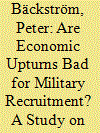

|
|
|
|
|
| Summary/Abstract |
This paper represents the first effort to explore the relationship between civilian labour market conditions and the supply of labour to the military in the all-volunteer environment that Sweden entered after the abolishment of the peacetime draft in 2010. The paper investigates the effect of civilian unemployment on the rate of applications from individuals aged 18–25 to initiate basic military training, using panel data on Swedish counties for the period 2011–2015. A linear fixed-effects model is estimated to investigate the relationship, while controlling for a range of socio-demographic covariates, unobserved heterogeneity on the regional level, as well as aggregate trends on the national level. The results of the panel-data analysis indicate that the unemployment rate has a positive and statistically significant effect on the application rate. These results are robust to non-linear form specifications, as well as allowing the civilian unemployment rate to be endogenous. As such, the results suggest that the civilian labour market environment in Sweden can give rise to non-trivial fluctuations in the supply of applications to initiate basic military training within the Swedish Armed Forces.
|
|
|
|
|
|
|
|
|
|
|
|
|
|
|
|
| 3 |
ID:
067394
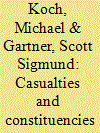

|
|
|
| 4 |
ID:
100968
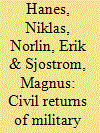

|
|
|
|
|
| Publication |
2010.
|
| Summary/Abstract |
The purpose of our study was to examine the effect of military training on the earnings of young men in Sweden. The analysis is based on the cohort of males born in 1973. This cohort was conscripted during a time of rapid change in Swedish security policy and substantial cutbacks in the armed forces. As a consequence, a relatively large proportion of the cohort was assigned a service category after the enlistment test but one third of these individuals were never conscripted. We argue that these organizational changes, along with data on important background variables, make it possible to rely on selection on observables. A clear finding is that military training has a positive effect on annual earnings at the age of 30 for those men in the category 'private soldier' who do not subsequently obtain a high level of educational.
|
|
|
|
|
|
|
|
|
|
|
|
|
|
|
|
| 5 |
ID:
094814
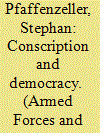

|
|
|
|
|
| Publication |
2010.
|
| Summary/Abstract |
The assumption of a mutually conditional relationship between democracy and conscription is a persistent aspect of the debate on civil-military relations. This article discusses the relationship between conscription and democracy, in a general sense and with reference to the German case. Following a review of conventional motives for conscription, it proceeds to discuss the relationship between conscription and democracy in terms of empirical coincidence and as a means of subjective military control. Continued assertion of an innate democracy-conscription nexus is found to be at variance with the evidence while retaining some influence over the ongoing debate on conscription. The conflation of democratic citizenship with conscription is linked to tensions with individual liberty and equality before the law.
|
|
|
|
|
|
|
|
|
|
|
|
|
|
|
|
| 6 |
ID:
174493
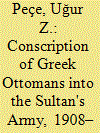

|
|
|
|
|
| Summary/Abstract |
With the reinstatement of the parliament in 1908, the Ottoman state faced new challenges connected to citizenship. As a policy to finally make citizens equal in rights as well as duties, military conscription figured prominently in this new context. For the first time in Ottoman history, the empire's non-Muslims began to be drafted en masse. This article explores meanings of imperial citizenship and equality through the lens of debates over the conscription of Greek Ottomans, the largest non-Muslim population of the Ottoman Empire. In contrast to the widespread suggestion of the Turkish nationalist historiography on these matters, Greek Ottomans and other non-Muslim populations enthusiastically supported the military service in principle. But amidst this general agreement was a tremendous array of views on what conscription ought to look like in practice. The issue came to center on whether Greek Ottomans should have separate battalions in the army. All units would eventually come to be religiously integrated, but the conscription debates in the Ottoman parliament as well as in the Turkish and Greek language press reveal some of the crucial fissures of an empire as various actors were attempting to navigate between a unified citizenship and a diverse population.
|
|
|
|
|
|
|
|
|
|
|
|
|
|
|
|
| 7 |
ID:
101329
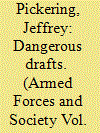

|
|
|
|
|
| Publication |
2011.
|
| Summary/Abstract |
Conscription has been claimed to both increase leaders' propensity to use military force abroad and constrain them from doing so. The author sheds new light on this longstanding controversy by presenting the first time-series, cross-national quantitative analysis of the impact that state military manpower systems (either conscription or volunteerism) have on the initiation of both traditional, belligerent military missions and "operations other than war" (OOTWs). Using negative binomial regression on 166 states from 1946 to 2001, the author finds that states with conscript militaries have a significantly higher propensity to use belligerent military force than states with volunteer armies. Countries that practice conscription are also more likely than countries with volunteer forces to launch a specific type of OOTW, military operations against nonstate actors such as rebels or terrorists. Neither form of military manpower system seems, however, to be significantly related to the initiation of humanitarian military operations.
|
|
|
|
|
|
|
|
|
|
|
|
|
|
|
|
| 8 |
ID:
107663


|
|
|
|
|
| Publication |
2011.
|
| Summary/Abstract |
With establishment of the U.S. Selective Service System in 1917, selective draft rules placed consideration of registrants' economic obligations to their dependents front and center. By observing the Canadian and British recruitment experiences, American policy makers opted against universal conscription since they believed it would be costly because of the need to offer family allowances and opted against a voluntary system since they believed that too many bachelors would fail to volunteer. Dependency deferments were designed to minimize the social and economic costs of war. Local board members determined whether a man was a genuine breadwinner or not, and individual discretion on this matter contributed to the higher rates of African American draftees during WWI compared to white draftees, since African American men were less likely to be recognized as genuine breadwinners. Selective Service rules thus resulted in reproducing female citizens as economic dependents and yielded durable inequalities among registrants.
|
|
|
|
|
|
|
|
|
|
|
|
|
|
|
|
| 9 |
ID:
178631


|
|
|
|
|
| Summary/Abstract |
Conscription typically involves migration to the duty base location. According to DaVanzo’s theory of repeat migration, this military-motivated migration might foster post-military migration. This paper investigates this issue empirically using individual-level data drawn from the 1992, 1998, and 2001 editions of the French survey of labor market entrants ‘Génération.’ The methods used to identify the causal effect of compulsory peacetime conscription on the post-military propensity to migrate exploit the abolition of conscription in France in October 1997 plus information on the timing of service among those who served. Conscription stimulated the post-military propensity to migrate for work of French male labor-market entrants with upper-class origins. Furthermore, there is evidence of a previously overlooked anticipatory effect of conscription: French males who were waiting to be called up for military service were approximately 25% less likely to migrate for work than comparable non-conscripts. Some implications of these findings and a consideration of their external validity are also provided.
|
|
|
|
|
|
|
|
|
|
|
|
|
|
|
|
| 10 |
ID:
146531
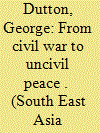

|
|
|
|
|
| Summary/Abstract |
This article examines the role and prominence of the military as the key institution of the new Nguyen dynasty in Vietnam at the beginning of the 19th century. The military had brought the new regime to power during the wars with the Tay Son regime, and the end of the conflict did not end the military’s role. I argue, contrary to existing scholarship which emphasizes the Nguyen as a civilian bureaucratic regime, that the military remained critical to the survival of the new regime. While the Nguyen slowly began the transition to civil rule, the military remained the predominant institution of the dynasty well into the middle of the century. Moreover, I argue that the regime’s military orientation had profound effects on the Vietnamese populations who were subject to conscription and the associated hardships of labor projects and suppression of insurgencies.
|
|
|
|
|
|
|
|
|
|
|
|
|
|
|
|
| 11 |
ID:
185494
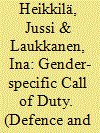

|
|
|
|
|
| Summary/Abstract |
We document that existing gender equality indices do not account for gender-specific mandatory peace-time conscription (compulsory military service). This suggests that gender-specific conscription is not considered to be an important gender issue. If an indicator measuring the gender equality of mandatory conscription was to be included in gender equality indices with appropriate weight, then the relative rankings of countries in terms of measured gender equality could be affected. In the context of the Nordic countries, this would mean that Finland and Denmark – the countries with mandatory conscription for men only – would have worse scores with respect to gender equality compared to Sweden and Norway, countries with conscription for both men and women – and Iceland, which has no mandatory conscription, regardless of gender.
|
|
|
|
|
|
|
|
|
|
|
|
|
|
|
|
| 12 |
ID:
085100
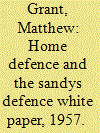

|
|
|
|
|
| Publication |
2008.
|
| Summary/Abstract |
Long understood as the key document in Britain's Cold War history, the Duncan Sandys Defence White Paper of 1957 nevertheless has a largely forgotten context: home defence. This article argues that understanding this context allows important new conclusions to be drawn concerning the drafting, presentation and the reception of the document and the deterrent strategy it expounded. It argues that the Paper failed to establish a new doctrine for civil defence which reconciled the policy with the wider deterrent strategy. In doing this, the Paper presented a muddled policy to the public: one which failed to justify the reductions in civil defence provision but which stressed the destructive power of thermonuclear weapons. This had the effect of encouraging the critics of the government's nuclear strategy to flag up the absence of adequate civil defence measures and highlight the 'admission' that there was no defence against the hydrogen bomb.
|
|
|
|
|
|
|
|
|
|
|
|
|
|
|
|
| 13 |
ID:
181641
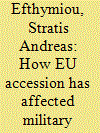

|
|
|
|
|
| Summary/Abstract |
This article explores how the concept of military service develops in the post-conflict society of Cyprus (RoC), following its accession to the European Union (EU). It is based on an exhaustive series of individual interviews with soldiers, lawyers, politicians, ambassadors and civilians, as well as an analysis of media content. The article sets out exactly how EU accession presented a confusing ideological trajectory for the army, lowering motivation for defending the border against occupying forces. The diminishing value of military service takes place against a background of changing masculine ideals. Moreover, defence diplomacy aiming to create energy alliances between EU member states against Turkey had the unintended consequence of young men further disassociating from direct involvement in the defence project. The article also analyses a number of policies developed to deal with conscription issues. Through the case study of Cyprus, we come to see how policy on military service during the EU accession process should incorporate changing civil-military relations.
|
|
|
|
|
|
|
|
|
|
|
|
|
|
|
|
| 14 |
ID:
182662


|
|
|
|
|
| Summary/Abstract |
The use of forced recruitment strategies during war can adversely affect military effectiveness and human rights. Given these costs, under what conditions do state leaders adopt coercive recruitment during civil wars? We find that between 1980 and 2009, states changed their recruitment practices 140 times during civil wars – half of which were towards coercive recruitment. Since structuralist explanations focus on factors that remain more or less constant over time, they cannot explain the frequency of these changes. Instead, we focus on individual-level factors and argue that leaders’ dispositions as risk-takers determine their beliefs about using force to solve collective action dilemmas during civil wars. Further, conflict context matters for leaders’ recruitment decisions – when rebel groups engage in coercive recruitment, leaders may also feel more justified in using such strategies. Using the LEAD Dataset and data on recruitment, we find that risk-tolerant leaders, including those who have had careers in the security sector, as well as those who have prior experience as a rebel or revolutionary leader, are more likely to use force to increase recruitment. While we theorize that this effect may be mitigated by combat experience, the evidence is mixed. Lastly, we find that rebels’ use of forced recruitment makes state leaders less likely to use voluntary recruitment.
|
|
|
|
|
|
|
|
|
|
|
|
|
|
|
|
| 15 |
ID:
178246
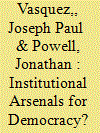

|
|
|
|
|
| Summary/Abstract |
Recent years have seen increased study of military coups. While this generally emphasizes coups as a dependent variable, there is a growing debate as to how coups influence a country’s long-term political trajectory. This literature includes a handful of studies that claim coups against authoritarian regimes can act for the public good and provide a boost to the state’s democratization prospects. Causal mechanisms have included factors such as aid conditionality, economic interdependence, and foreign pressure more generally. We argue that this growing body of work can benefit from increased attention given to those who carry out coups: the armed forces. Specifically, we argue that coups reflecting a larger societal interest, be it the removal of a dictator or the desire for democracy after a dictator’s ouster, are more likely undertaken by conscript armies. A cross-national exploration of over 170 coups suggests that conscript militaries are in fact significantly more likely to oversee democratic transitions following military coups. Beyond contributing to a broader literature on civil–military relations, the article points to important policy implications for developing nations.
|
|
|
|
|
|
|
|
|
|
|
|
|
|
|
|
| 16 |
ID:
167825
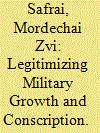

|
|
|
|
|
| Summary/Abstract |
By the 1970s, it was clear to the western world that the days of mass armies, based on broad conscription, were over. In Israel, however, despite the presence of some elements similar to those which elsewhere were leading to military contraction and a transition to all-volunteer forces, the Israel Defense Force (IDF) broadened its conscription model and embarked on massive growth. The effects of this surprising strategy are evident to this day, with Israel remaining almost the only conscription-based army in the West. Analysis of the organizational discourse and processes within the IDF in the wake of the Yom Kippur War reveals that social legitimacy is not only a prerequisite for organizational growth and boosting of enlistment but also, simultaneously, a product of the process. The organizational mechanisms used by the IDF to achieve social consent are relevant for an understanding of the processes of militarism and military buildup in our times, too.
|
|
|
|
|
|
|
|
|
|
|
|
|
|
|
|
| 17 |
ID:
190783
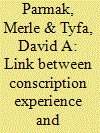

|
|
|
|
|
| Summary/Abstract |
The purpose of the study is to investigate the relationship between the experience of conscripts in their training period and their subsequent attitude toward national military service immediately after training. Self-report questionnaire is used to measure the experiences of Estonian conscripts (n = 518) in three categories: perceived stress, applied coping strategies, and evaluation of training as important. Attitude toward national military service is measured as a critical versus neutral/positive answer to an open-ended question. We found that a perceived reduction in general quality of life, concerns about what is happening at home, and experiencing/expressing negative emotions were associated with a critical attitude. In contrast, taking a proactive outlook toward training and finding military-specific aspects personally important were associated with a more neutral/positive attitude. Our findings emphasize the importance of improving the conscription training experience in order to foster less critical attitudes toward service and are discussed from a person-environment perspective.
|
|
|
|
|
|
|
|
|
|
|
|
|
|
|
|
| 18 |
ID:
153623
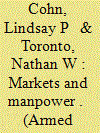

|
|
|
|
|
| Summary/Abstract |
Economic studies of military manpower systems emphasize the advantages of voluntarism under all but the most total threats, but this explains neither the persistence of institutionalized conscription in many states nor the timing of shifts from such conscription systems to volunteer militaries. Traditional explanations focus on external threat levels, but this has also proven unsatisfying. We theorize that threat variables establish the state’s baseline need for manpower, but structural economic variables determine whether the necessary manpower can be more efficiently obtained by conscription or voluntarism. Using a new data set of 99 countries over 40 years, we find that states with British origins are less likely and those experiencing greater external threat are more likely to employ conscripts. Most importantly, states with more highly regulated labor markets are more likely to employ conscripts, which suggests that, controlling for a number of relevant factors, labor markets matter in military manpower decisions.
|
|
|
|
|
|
|
|
|
|
|
|
|
|
|
|
| 19 |
ID:
107665
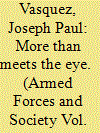

|
|
|
|
|
| Publication |
2011.
|
| Summary/Abstract |
At first glance, Britain's decision in 1957 to end conscription appears to be explainable solely by external factors since that change coincided with the decision of Harold Macmillan's government to bolster its nuclear capability following the embarrassing Suez Crisis. Furthermore, the decision was framed as a cost-cutting move amid budgetary challenges. However, that decision was substantially influenced by the fact that deployment of conscripts was heavily constrained by British domestic politics. Similarly, the merits of conscription for generating a large pool of reservists had limited utility given the political sensitivity of mobilizing reservists. The nature of the domestic constraints-both political and social-on conscription are also evident in the fact that London opted to forego selective service and scrap mandatory military service altogether. This action accelerated British imperial decline after independence was granted to India, which had previously been a sizeable colonial reservoir of British military manpower.
|
|
|
|
|
|
|
|
|
|
|
|
|
|
|
|
| 20 |
ID:
188794
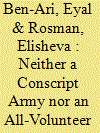

|
|
|
|
|
| Summary/Abstract |
This article develops an analytical model of force composition that combines the advantages of conscription with those of an all-volunteer force. Using Israel as a hypothesis-generating case study, it argues that mandatory military service has undergone changes centered on five key organizing principles: selective conscription, early discharges, elongated lengths of service, forms of voluntary service and differing pay-scales, and other material and non-material incentives for conscripts. These principles are “grafted” onto conscription creating a hybrid, “volunteer-ized” model. The utility of the theoretical model lies in explaining how these principles facilitate mobilizing a needed number or recruits, providing an adequate level of military expertise, as well as maintaining the legitimacy of the armed forces by meeting domestic social, economic, and political expectations about its composition and the use of personnel at its disposal. The system is adaptive and flexible, as shown through the comparisons throughout the paper.
|
|
|
|
|
|
|
|
|
|
|
|
|
|
|
|
|
|
|
|
|